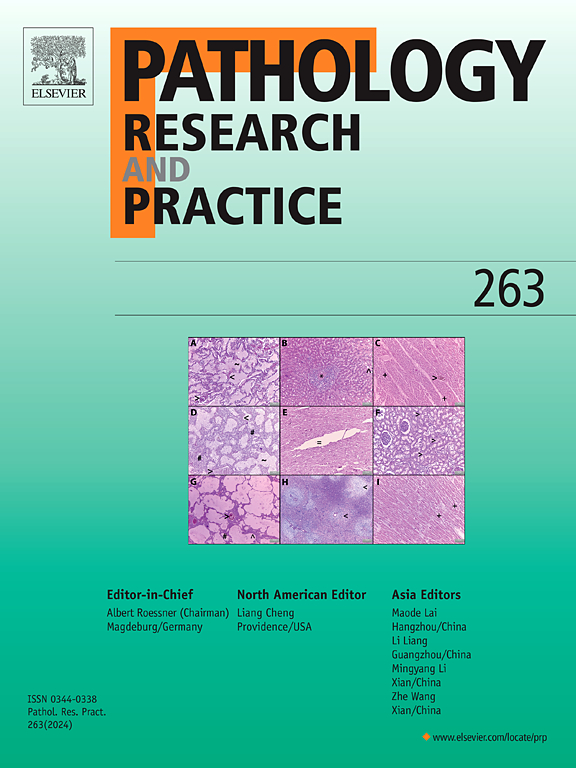癌症的代谢-表观遗传重布线:乳酸化在肿瘤进展、免疫逃避和治疗抵抗中的作用
IF 3.2
4区 医学
Q2 PATHOLOGY
引用次数: 0
摘要
研究表明赖氨酸乳酸化(kla)代表了一种新的翻译后修饰,将癌症代谢与表观遗传调控联系起来。通过Warburg效应产生乳酸与组蛋白和非组蛋白的乳酸化有关,组蛋白和非组蛋白调节与肿瘤进展、治疗抵抗和免疫逃避相关的关键基因表达程序。这篇综述整合了最近关于糖酵解水平升高以及肿瘤微环境(TME)中乳酸浓度升高如何通过乳酸化介导的机制触发转录激活的研究结果。它强调了乳酸化如何与其他酰化相互作用,有助于癌症干细胞的发展,重塑免疫景观,并降低各种肿瘤类型的药物疗效。乳酸化表达升高与患者预后差、CD8 + T细胞浸润减少、肿瘤部位免疫检查点蛋白表达增加相关,从而产生免疫抑制环境。癌细胞的存活部分取决于乳酸化,因为它可以提高DNA修复效率,防止铁凋亡,并调节与治疗耐药性相关的基因。研究人员目前正在评估针对乳酸代谢酶(LDH, mct)和乳酸化的表观遗传“书写者”(如p300/ creb结合蛋白)的新疗法,以破坏致癌信号通路。乳酸化的诊断相关性也越来越受到关注,因为它可以作为肿瘤进展和治疗反应的潜在生物标志物。乳酸酰化作为一种重要的表观遗传调控机制,为癌症精准治疗开辟了新的途径,值得进一步深入研究。本文章由计算机程序翻译,如有差异,请以英文原文为准。
Metabolic-epigenetic rewiring in cancer: The role of lactylation in tumor progression, immune evasion, and therapy resistance
Research shows that lysine lactylation (kla) represents a novel post-translational modification that links cancer metabolism with epigenetic regulation. The production of lactate through the Warburg effect is associated with the lactylation of both histone and non-histone proteins, which regulate key gene expression programs linked to tumor progression, therapy resistance, and immune evasion. This review integrates recent findings on how elevated glycolysis levels, along with increased lactate concentrations in the tumor microenvironment (TME), trigger transcriptional activation through lactylation-mediated mechanisms. It highlights how lactylation interacts with other acylations, contributes to the development of cancer stemness, remodels the immune landscape, and reduces drug efficacy across various tumor types. Elevated lactylation expression correlates with poor patient outcomes, diminished CD8⁺ T cell infiltration, and increased expression of immune checkpoint proteins at tumor sites, thereby creating an immunosuppressive environment. The survival of cancer cells depends in part on lactylation, as it enhances DNA repair efficiency, protects against ferroptosis, and regulates genes associated with therapeutic resistance. Researchers are currently evaluating novel therapeutics that target enzymes involved in lactate metabolism (LDH, MCTs) and epigenetic "writers" of lactylation, such as p300/ CREB-binding protein, to disrupt oncogenic signaling pathways. The diagnostic relevance of lactylation is also gaining attention, as it serves as a potential biomarker for tumor progression and treatment response. As a critical epigenetic regulatory mechanism, lactylation opens new avenues for the development of precise cancer therapies, warranting further in-depth investigation.
求助全文
通过发布文献求助,成功后即可免费获取论文全文。
去求助
来源期刊
CiteScore
5.00
自引率
3.60%
发文量
405
审稿时长
24 days
期刊介绍:
Pathology, Research and Practice provides accessible coverage of the most recent developments across the entire field of pathology: Reviews focus on recent progress in pathology, while Comments look at interesting current problems and at hypotheses for future developments in pathology. Original Papers present novel findings on all aspects of general, anatomic and molecular pathology. Rapid Communications inform readers on preliminary findings that may be relevant for further studies and need to be communicated quickly. Teaching Cases look at new aspects or special diagnostic problems of diseases and at case reports relevant for the pathologist''s practice.

 求助内容:
求助内容: 应助结果提醒方式:
应助结果提醒方式:


